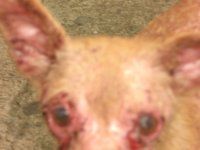Source: www.pet-grub.com
If you wish to quickly print this entire book with the greatest of ease, please read the following page:
How To Prevent Vomiting While Feeding Your Dog or Cat Natural Homemade Pet Food
Sponsored Links
Sometimes a dog or cat will vomit after being introduced to a natural, wholesome, raw meat diet for the first time or within the first week of eating a raw meat diet. But why?
On this page, I will explain the simple solution to reversing this vomitting — but first, a little introduction as to why the vomitting can happen and then how to solve it.
Dogs will sometimes vomit simply because it's in their nature to eat as fast as they can and when they eat so fast, the body may be forced to vomit its food. When this happens, the dog usually then eats its own vomit. But the type of vomitting I am talking about here is what happens after a natural, raw meat diet is first introduced.
Some people think that something is wrong with the food they are feeding — some might even think perhaps this raw meat diet thing isn't that good after all because my dog never vomitted the commercial food I fed it?
Interestingly enough, it's because the raw meat diet is beneficial that the vomitting occurs!!!
You see, a carnivore's digestive system is naturally highly acidic, at least that's the way it is supposed to be. However, cooked foods including cooked meat and commercial pet food can actually work to shut down the carnivore's highly acidic digestive system — whereas raw meat, which is the more natural diet for a carnivore to eat, can actually stimulate the carnivore's digestive system to become more acidic.
The carnivore's digestive system is naturally acidic because the acid is used not only to help digest the protein in the meat, assimilate the calcium in the blood of the prey, etc, but also because the high acidity works to kill bacteria! This is why, in my experience, pets are less likely to get food poisoning from eating raw meat and more likely to get food poisoning from cooked meats or commercial pet foods. In fact, in all the years I have been helping people feed a raw meat diet, I have not personally experienced food poisoning while feeding raw meat. But of course, a pet with a severely weak immune, regardless of the diet being fed could be susceptible to food poisoning. But here's a funny story...
Years ago, a lady contacted me about her two puppies that were vomitting and clearly had signs of food poisoning. She informed me that she was feeding the food her vet had recommended. She asked what would I suggest and I told her that first she thing needed to do was to take her puppies to the vet to get them stabilized so they would not become dehydrated. Next, I suggested that once she got her puppies home that she consider feeding a raw meat diet. I suggested this because studies like Dr. Pottenger's 10 year study of cats showed that the cats which ate cooked meat got food poisoning and other health problems while the cats eating raw meat were healthy. Additionally, I informed her that research has shown that commercial pet foods can actually contain bacteria that cause food poisoning.
So the lady went to her vet and explained the situation and how her puppies got sick while eating the food the vet had suggested. She then asked her vet what he thought about feeding a wholesome raw meat diet as an alternative to his food. Well, the vet only heard the words raw meat
and immediately proclaimed that if she was going to continue feeding a raw meat diet then he could not guarantee that her puppies would not get food poisoning again. The lady, stunned by the vets remarks, said nothing as obviously vet did not realize that the puppies hadn't even started eating raw meat yet and that they in fact got sick while eating the food recommended by the vet.
Later that day, the lady called me again and told me that her puppies were doing fine and that she started feeding a raw meat diet as soon as she got home!
So while it's always possible for a dog or cat to get food poisoning from eating raw meat, my experience has shown it's less likely to happen than when feeding a commercial diet and/or cooked meat. In fact, dogs have been known to bury bones for weeks at a time, dig up the bones and eat the completely rancid meat without any problems. Lions in Africa have been known to eat meat that has been rotting in the hot African sun for days without any problems also!
But getting back to vomitting — on this page I am actually talking about the vomitting that happens when you introduce a wholesome, homemade, raw meat diet. Why does this vomitting happen?
Well, as mentioned, a carnivore's digestive system is meant to be highly acidic yet cooked meats and commercial pet foods are said to shut the digestive system down.
So in some situations, a dog or cat will actually vomit the raw meat, but why?
The reason is because the digestive system of the pet that is vomitting is weak. When you feed the raw meat, the body's natural course of action is to produce more acid — but due to the weakened digestive system, the body has difficulty creating the extra acid. As a result, the body vomits the food.
So while this vomitting may appear to be a problem, it is actually in a weird sort of a way, a positive sign indicating your pet's body is trying to get stronger.
Over time, as the body gets stronger, the vomitting will begin stop. But before the body gets strong enough to handle the raw meat, what can be done to help solve this problem?
In my experience, the solution is to add some digestive enzymes to the diet. By adding digestive enzymes to the diet, digestion becomes easier and the vomitting stops. I definitely prefer to use pancreatic (meat) derived enzymes. I find that fungal (vegetarian) derived enzymes are simply not strong enough to help the pets who have a weakened digestive system.
Pancreatic derived enzymes are derived from the pancreas of an animal and are the more natural source of enzymes for carnivores. My preference is to give FloraZyme LP, which is an excellent pancreatic derived enzyme supplement for dogs and cats.
Initially, when giving the enzymes, you might need to double the dose for the first month or so before going back to the regular suggested dose. After your pet's digestive system is stabilized, you can, if you want, stop providing the enzymes but in my opinion your pets will do much better if you continue giving the enzymes daily, although at the normal dose. This is because the more you improve digestion, ultimately the healthier your pet will be.
Even if a pet does not vomit when a raw meat diet is introduced, one will still find supplemental enzymes beneficial as this will help maximize the digestion of food.
So if your dog or cat is vomitting after a raw meat diet is introduced, you may need to feed its old diet until the enzyme supplements can be introduced as it is important that your dog or cat eats food, even if it is low quality food. At the same time, whenever there is vomitting, one must always be concerned about dehydration. So by feeding the old diet until such time the enzymes can be introduced, you help prevent dehydration.
If you introduce the enzymes to the diet and there is still vomitting, you can first try to increase the amount of enzymes given to see if that helps and then, if there is still a problem then that means something else is happening in the body and that you would need your pet to be checked by a vet. But in my experience, the simple solution for those pets vomit once introduced to a raw meat is simply adding digestive enzymes to the diet. Once this happens, my experience has shown that the vomitting problem stops.
Poor digestion is the cause of so many health problems as without good digestion, the body cannot get the nutrition from the food it is eating — and without nutrition, the body does not have the fuel it needs to be maintain good health — and that's why enzymes are the secret, natural and healthy weapon that help combat many health problems.
Part 3 C'est Fini!
C'est fini is French for it's finished
! After reading Part 1, Part 2 and Part 3, you have all the knowledge you really need to begin feeding a wholesome homemade diet. I do encourage you to keep reading, appecially Appendix A which talks about detoxification. You see, when you begin to feed wholesome foods to your pets — strange things begin to happen. The body begins to get stronger. One sign that the body is getting stronger is detoxification. Almost all pets who are introduced to a wholesome raw meat diet will experience a detox — some very gentle, some more sever. Understanding detoxification is important because that way you won't be scared when it happens. Detoxification is not something understood by the mainstream medical community, whether they be vets or medical doctors. Instead, detoxification is only understood by those who understand holistic health, healing and nutrition.
Of course, if you want, you can read Part 3 again or move on to Appendix A.
 Meet Jumbo, the participant in
Meet Jumbo, the participant in 